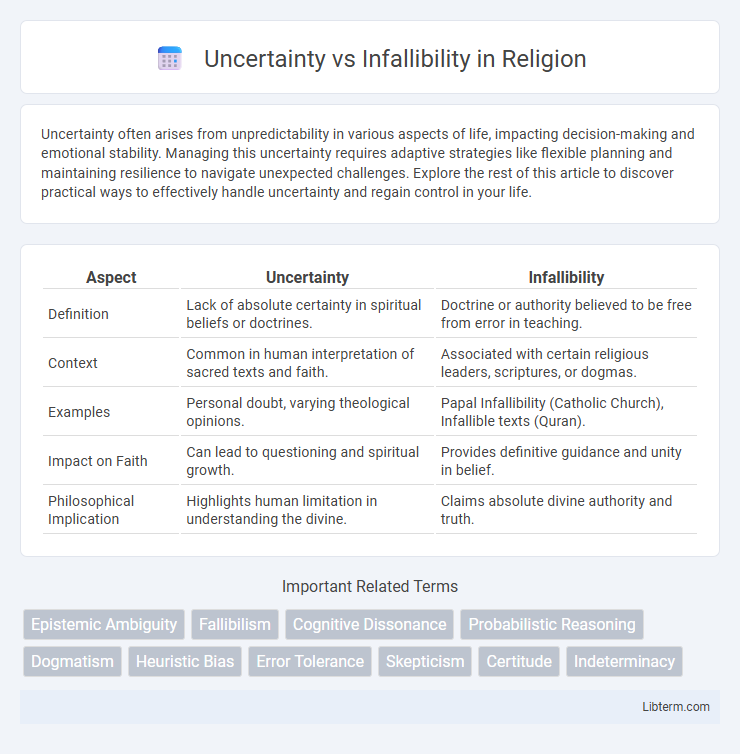Uncertainty often arises from unpredictability in various aspects of life, impacting decision-making and emotional stability. Managing this uncertainty requires adaptive strategies like flexible planning and maintaining resilience to navigate unexpected challenges. Explore the rest of this article to discover practical ways to effectively handle uncertainty and regain control in your life.
Table of Comparison
| Aspect | Uncertainty | Infallibility |
|---|---|---|
| Definition | Lack of absolute certainty in spiritual beliefs or doctrines. | Doctrine or authority believed to be free from error in teaching. |
| Context | Common in human interpretation of sacred texts and faith. | Associated with certain religious leaders, scriptures, or dogmas. |
| Examples | Personal doubt, varying theological opinions. | Papal Infallibility (Catholic Church), Infallible texts (Quran). |
| Impact on Faith | Can lead to questioning and spiritual growth. | Provides definitive guidance and unity in belief. |
| Philosophical Implication | Highlights human limitation in understanding the divine. | Claims absolute divine authority and truth. |
Understanding Uncertainty and Infallibility
Understanding uncertainty involves recognizing the inherent limitations in predicting outcomes due to incomplete information, variability, or complexity within systems. Infallibility, in contrast, denotes an absolute state of error-free knowledge or decision-making, often an ideal rather than a practical reality. Grasping the distinction enhances critical thinking by encouraging cautious judgment where uncertainty prevails and confidence when infallible data or processes are established.
The Nature of Human Knowledge
Human knowledge is inherently uncertain due to the limitations of perception, cognitive biases, and incomplete information, making infallibility unattainable. Epistemology reveals that knowledge evolves through hypothesis testing, falsification, and continuous refinement rather than absolute certainty. Scientific methods emphasize probabilistic models and empirical evidence, underscoring that uncertainty is a fundamental aspect of understanding reality.
Uncertainty in Scientific Exploration
Uncertainty in scientific exploration drives the continuous refinement of hypotheses and experimental methods, reflecting the inherent variability and complexity of natural phenomena. Embracing uncertainty enables researchers to develop robust models that accommodate new data and revise previous understandings. This dynamic process ensures scientific knowledge remains adaptive and progressively accurate, fostering innovation and deeper insights.
Infallibility: Myth or Reality?
Infallibility, often perceived as a flawless ability to avoid error, remains more myth than reality due to inherent human cognitive limitations and the complexity of knowledge systems. Scientific methodologies and decision-making frameworks embrace uncertainty as a fundamental aspect, emphasizing error margins and probabilistic outcomes instead of absolute certainty. Real-world applications demonstrate that acknowledging uncertainty fosters resilience and adaptability, challenging the concept of infallibility as a practical or attainable standard.
Cognitive Bias and the Illusion of Certainty
Cognitive bias distorts human judgment by creating systematic errors in decision-making, often reinforcing the illusion of certainty despite inherent uncertainty. This illusion arises when individuals overestimate the accuracy of their knowledge, ignoring conflicting evidence or alternative perspectives. Understanding these biases is crucial to mitigate overconfidence and promote more realistic assessments of infallibility in cognitive processes.
The Role of Doubt in Intellectual Growth
Doubt serves as a crucial catalyst in intellectual growth by challenging assumptions and fostering critical thinking, which drives deeper understanding and innovation. Embracing uncertainty encourages the exploration of alternative viewpoints and the refinement of knowledge, preventing cognitive stagnation. Intellectual progress relies on the balance between acknowledging fallibility and maintaining confidence in well-supported ideas.
Embracing Uncertainty for Better Decision-Making
Embracing uncertainty enhances decision-making by encouraging flexibility and adaptive thinking, critical in complex and dynamic environments. Recognizing the limits of infallibility fosters a mindset open to new information and alternative perspectives, improving problem-solving accuracy. By valuing uncertainty, organizations and individuals can develop resilient strategies that anticipate change and mitigate risks effectively.
Infallibility in Religion and Philosophy
Infallibility in religion and philosophy refers to the inability to be wrong or make errors, often attributed to divine beings or holy texts, ensuring absolute truth and moral authority. Philosophical discussions emphasize infallibility as a mark of perfect knowledge, contrasting human cognitive limits and the inherent uncertainty in empirical understanding. The concept serves as a foundation for faith-based systems, affirming unwavering certainty in spiritual doctrines despite the complexity of human doubt.
Uncertainty vs. Infallibility in Daily Life
Uncertainty in daily life influences decision-making by requiring individuals to navigate outcomes without guaranteed accuracy, contrasting with infallibility, which implies flawless judgment or error-free knowledge. Embracing uncertainty fosters adaptability and critical thinking, while reliance on perceived infallibility can lead to overconfidence and resistance to new information. Balancing awareness of uncertainty with the pursuit of reliable information enhances problem-solving and resilience in everyday situations.
Striking a Balance: Moving Beyond Absolutes
Striking a balance between uncertainty and infallibility involves embracing probabilistic thinking and acknowledging the limits of absolute certainty. Effective decision-making integrates flexible strategies that adapt to new information while avoiding the pitfalls of dogmatic beliefs. This approach fosters resilience in complex systems by prioritizing evidence-based adaptability over rigid infallibility.
Uncertainty Infographic

 libterm.com
libterm.com